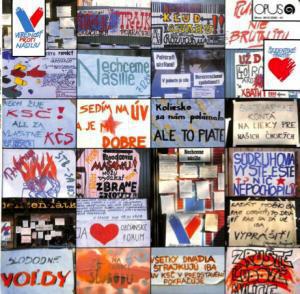
The first three post-war years were very dramatic for Slovakia. The territory formerly occupied by Hungary was returned to Slovakia, which was also confirmed by the Paris peace agreement of 1947. As in the Czech lands, the Germans had to leave Slovakia. The agreed exchange of inhabitants between Hungary and Slovakia was not fully realized. Germans and Hungarians seized the civil rights, schools, the government tried to press Hungarians to became Slovaks. After 1948 the discrimination measures were step by step abolished.
The mines, forges, the majority of industry and financial institutions were nationalized. The political system, officially called a peoples democracy, was characterized by very little democracy in practice. A complicated three year struggle between the forces supporting parliamentary democracy and the communists, who called for a regime of the Soviet type, concluded in February 1948 with the defeat of democracy in Czechoslovakia. In Slovakia, it culminated even sooner.
In contrast to the Czech lands, where the communists were victorious in the first postwar election of 1946, in Slovakia the majority of the inhabitants (62%) supported the Democratic Party. It was in the majority in parliament (the Slovak National Council) and in the Slovak government (Board of Commissioners). After communists grasped the power, they sought to establish a totalitarian, uncontrollable power very quickly.
In the Autumn of 1947 the joint effort of the Czech and Slovak communists and the Czech anti-Slovak parties attempted to limit the autonomy of Slovakia and restore the prewar unitary state culminated in a non parliamentary and anti-constitutional change in the distribution of power in favor of the communists. Terror and provocations by the police, determined the future development of Czecho-Slovakia after February 1948. Dissatisfaction with the dictatorship of communists was increasing among the population since the fifties.
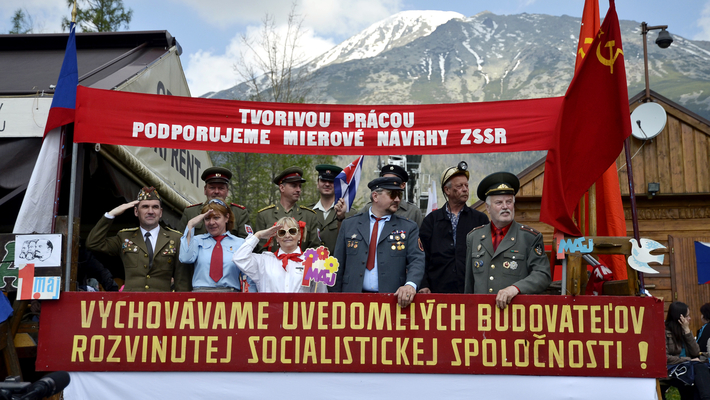
The communist dictatorship in Czechoslovakia was the same in all of its basic features with that of Stalin’s regime in the Soviet Union and other eastern European countries. The rapidly installed totalitarian regime liquidated non-communist political parties, interest groups and unions. The opposition groups and even potential opponents (namely the farmers, small tradesmen, members of the prohibited political parties and representatives of the Church) were often removed by direct terror: imprisonment, confinement in labor camps, the confiscation of property, expulsion from towns and show trials.
Public life, the economy and culture were subordinated to the communist party and Leninist ideology. After a radical nationalization, all spheres of life found themselves in the hands and power of the state, not only large factories and businesses and financial institutions but also small enterprises, lawyers offices, and medical offices. The existence of all of the inhabitants depended completely upon the state. This is a demonstration of pioneers - young people to support good times and cooperation and friendship with USSR forever.
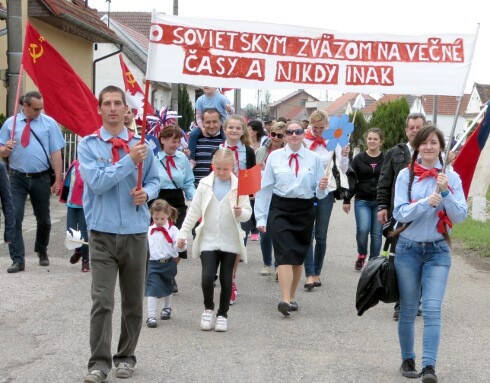
The radical changes deeply influenced the structures of society, which had been formed over many centuries, as well as its customs and values. Industrialization resulted in a greater mobility of the population. While in 1948 there were 216,000 employed in industry, by 1965 the number was almost 504,000 and in 1985 it had reached 800,000. Others were employed in the transport and building industries, in health sector and schools. A whole scale migration of inhabitants from the villages to the towns occurred hand in hand with an increase in formal education. In 1970, one-third of the population of Slovakia received either secondary or vocational education.
The extreme centralism halted any real creative initiative but offered a minimum of social security and a simple standard of living to all. The intellectuals held back the disapproval both because of fear of prosecution and because of the evident quantitative growth of education and culture.
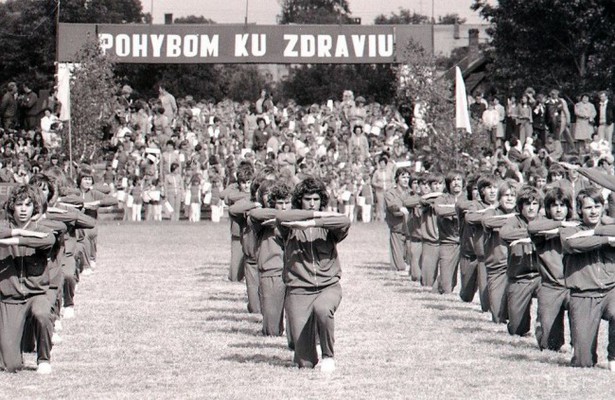
Mass sports events called SPARTAKIADA showed people support socialism and health
Strong social and cultural changes resulted after the terror in the 1950s. The next decade witnessed a kind of relaxation and there appeared a few strong groups within the communist party and its non members, which tried to abolish the system or to reform it. This process became known in the history as an attempt of socialism with human face.
The struggle to change the system was the same all over the country. But between the development in Czechia and Slovakia there were certain differences. The establishment of a communist dictatorship also resulted in a strong centralism. First it limited the legal power of the Slovak authorities, the Slovak National Council and the Board of Commissioners. After the adoption of the “socialist” constitution law of 1960 they were practically liquidated. While the Czech reform movement of the 1960s emphasized the democratization of the system, the Slovak movement joined to this the restoration of the independence of Slovakia and the federalization of Czechoslovakia.
In 1968, the changes in the highest state functions started. First Slovak – Alexander Dubček was elected at the forefront of the government. Together with the so-called reformed communists he began to implement fundamental political and social changes that were enthusiastically supported by a simple majority of the population. They hoped that period of socialism with a human face would begin.
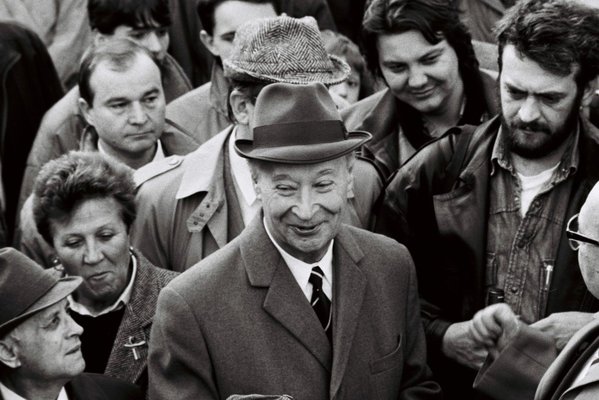
Events resulted in the Prague Spring 1968. The censorship was abolished, the public meetings continued, the religious freedom partly occurred. One of the achievements of the Prague Spring was the idea of creating a Czech-Slovak Federation. The Constitutional Law of Federation was finally adopted by the parliament on 27th of October in 1968.
Sympathies of the population and abroad, however, did not convince the leaders of the USSR led by Leonid Brezhnev and many other representatives of the Communist Party. Therefore they decided to stop this process by using violence. On the night of 20th to 21st of August in 1968 the army of five Warsaw Pact countries (People’s Republic of Bulgaria, People’s Republic of Hungary, People’s Republic of Poland, Socialist Republic of Romania, and Union of Soviet Socialist Republics) entered Czechoslovakia. An attempt to reform the socialism in democratic way was brutally suppressed.
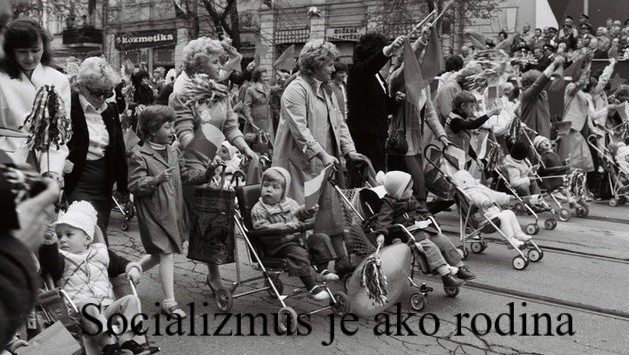
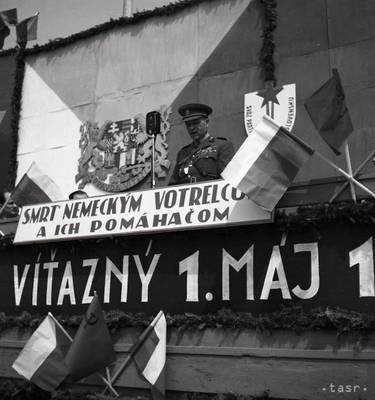
Celebration of labour Day during socialism
The occupation of the country in August 1968 by the troops of the Warsaw Pact nipped the reform policy in the bud. The power was seized by dogmatic communists and Czechoslovakia became in effect a vassal state of the Union of Soviet Socialist Republics.
Alexander Dubček, the Slovak reform communist and the symbol of the “Prague spring” was replaced in April 1969 by Gustáv Husák. Even though he was sentenced to life imprisonment in 1954 as a Slovak “nationalist”, as the General secretary of the communist party and President of the republic, he joined in preventing the full implementation of the federation.
Under the conditions of a state monopoly of power and the neo-Stalinist communist party, the organs of the Slovak Republic had more of a symbolic than a practical significance. They actually had less power, in some cases, than the regional offices, which existed in the unitary Czechoslovak Republic between the wars.
It is understandable, therefore, that as in the 1960s, the opposition in Slovakia devoted its attention to national and constitutional questions even during the 1970s and 1980s. In comparison with the 1960s, the criticism of the totalitarian regime was of a more radical character. The dogmatism and the intolerance of the communist party leadership, which limited itself to copying Moscow standpoints and views, affected the life of the country in a negative manner and, paradoxically, suppressed the communist party itself.
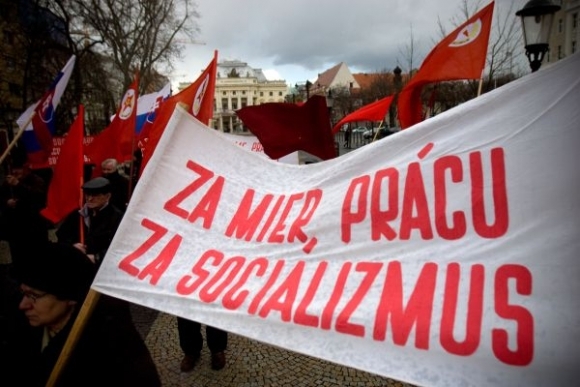
A great majority of the afflicted followers of the reform movement of 1968 found communism hopeless and accepted the idea of a parliamentary democracy and a market economy. During the last two decades, the younger generations were immune to the ideology of communism. The movement made up of those who believed in the freedom of religion and civil equality, of environmentalists with crucial goals, non-conform artists and scientists.
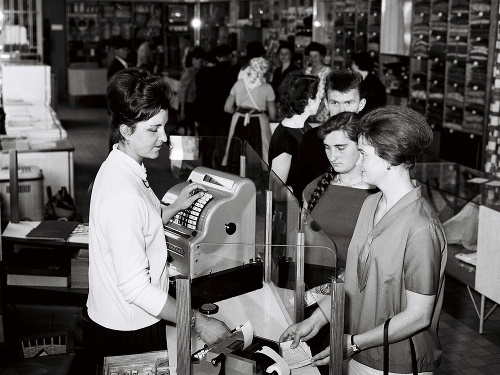
shops during socialism